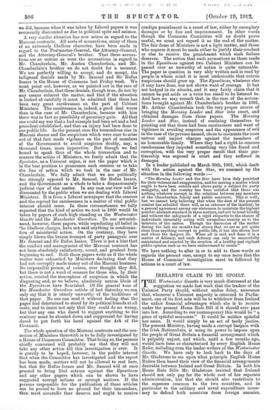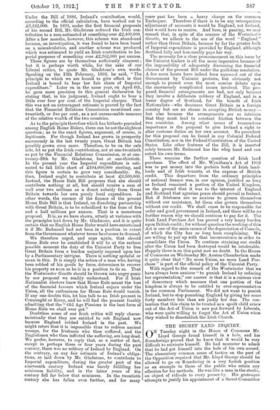IRELAND'S CLAIM TO BE SPOILT.
THE Westminster Gazette is very much distressed at the suggestion we made last week that the leaders of the Unionist Party should, without undue delay, announce that, whenever a Unionist majority is returned to Parlia- ment, one of its first acts will be to withdraw from Ireland the unfair financial advantages which she is to receive under the present Home Rule Bill if it should ever pass into law. According to our contemporary this would be " piece of spiteful meanness." It would be neither spiteful nor mean. It would simply be an act of tardy justice. The present Ministry, having made a corrupt bargain with the Irish Nationalists, is using its power to impose upon the people of Great Britain a financial arrangement which is palpably unjust, and which, until a few months ago, would have been so characterized by every English Home Ruler, including even the leader-writers of the Westminster Gazette. We have only to look back to the days of Mr. Gladstone to see upon what principle English Home Rulers then based their view of the financial arrangements desirable between Ireland and Great Britain. In both his Home Rule Bills Mr. Gladstone insisted that Ireland. should not only pay for the whole cost of her separate administration, but that she should also contribute to the expenses common to the two countries, and in particular to the military and naval expenditure neces- sary to defend both countries from foreign enemies. Under the Bill of 1886, Ireland's contribution would, according to the official calculation, have worked out to £3,242,000. In 1893, under the first financial proposals Of his second Bill, Mr. Gladstone reduced the Irish con- tribution to a sum estimated at something over £2,400,000. After a few months, however, this scheme was abandoned because, on investigation, it was found to have been based on a miscalculation, and another scheme was produced which was estimated to yield an Irish contribution to Im- perial purposes of something over £2,262,000 per annum. These figures are by themselves sufficiently eloquent ; but it is perhaps worth while, for the sake of our Liberal critics, to quote Mr. Gladstone's own words. Speaking on the 13th February, 1893, he said, " The principle to which we are bound. to give effect is that Ireland is bound to bear her fair share of Imperial expenditure." Later on in the same year, on April 6th, he gave more precision to this general declaration by stating that, in his judgment, Ireland ought to bear a little over four per cent. of the Imperial charges. That this was not an extravagant estimate is proved by the fact that the Financial Relations Commission mentioned one- twentieth, or five per cent., as a not unreasonable measure of the relative wealth of the two countries.
As to the principle therefore which has hitherto prevailed among English Home Rulers, there can be not the slightest question ; as to the exact figures, argument, of course, is legitimate. For though Ireland has grown in prosperity enormously in the last twenty years, Great Britain has possibly grown even more. Therefore, to be on the safe side, let us put the Irish contribution, not at one-twentieth as put by the Financial Relations Commission, or at one- twenty-fifth by Mr. Gladstone, but at one-thirtieth. In the present year the Imperial expenditure is esti- mated to fall little short of £104,000,000 sterling, and this figure is certain to grow very considerably. So, then, Ireland ought to contribute at least £3,500,000. Instead, the Home Rule Bill proposes that she should contribute nothing at all, but should receive a sum of -well over two millions as a direct subsidy from Great Britain towards her own purely local expenditure. In other words, the essence of the finance of the present Home Rule Bill is that Ireland, on dissolving partnership with Great Britain, is to be subsidized to the tune of five and a half millions per annum. That is a monstrous proposal. It is, as we have shown, utterly at variance with the principles laid down by Mr. Gladstone, and it is quite certain that no English Home Ruler would have entertained it if Mr. Redmond had not been in a position to extort from the Government whatever terms he chooses to demand.
We therefore urged, and urge again, that should Home Rule ever be established it will be at the earliest possible moment the duty of the Unionist Party to free Great Britain from a burden unjustly imposed upon her by a Parliamentary intrigue. There is nothing spiteful or mean in this. It is simply the action of a man who, having been robbed of his goods by force, determines to recover his property as soon as he is in a position to do so. That the Westminster Gazette should be thrown into angry panic by our proposal we readily understand. For if Irish Nationalist electors knew that Home Rule meant the loss of the financial favours which Ireland enjoys under the Union, all the enthusiasm for Home Rule would vanish. If any one doubts this, let him talk to an Irish peasant in Connaught or Kerry, and he will find the peasant frankly admitting that the " Old Age Pinsions is the best form of Home Rule we shall ever get." Doubtless some of our Irish critics will reply charac- teristically that they are entitled to rob England now because England robbed Ireland in the past. We might retort that it is impossible thus to redress ancient wrongs, for the Irishmen who then suffered, and the Englishmen who then inflicted the suffering, are long dead. We prefer, however, to reply that, as a matter of fact, except in perhaps three or four years during the past century, there was no robbery of Ireland by England. On the contrary, on any fair estimate of Ireland's obliga- tions, as laid down by Mr. Gladstone, to contribute to Imperial expenditure, during the greater part of the nineteenth century Ireland was barely fulfilling her minimum liability, and in the latter years of the century fell far below that minimum. In the twentieth century she has fallen even further, and for many years past has been a heavy charge on the common Exchequer. Therefore if there is to be any retrospective adjustment of accounts it would be England, not Ireland, that would have to receive. And here, in passing, we may remark that, in spite of the censure of the Westminster Gazette, we adhere to the use of the word " England " rather than Great Britain, because by far the greater bulk of Imperial expenditure is provided by England, although Scotland fully and honourably pays her way. The necessity for a clear pronouncement on this issue by the Unionist leaders is all the more imperative because of the impossibility of adequately discussing the financial clauses of the present Bill under the guillotine resolution. A few more hours have indeed been squeezed out of the Government by Unionist protests, but obviously not enough to permit even the most concise debate upon the enormously complicated issues involved. The pro- posed financial arrangements are bad, not only because they involve a deliberate robbery of England, and in a lesser degree of Scotland, for the benefit of Irish Nationalists—who denounce Great Britain as a foreign country but see no shame in accepting British money— but also because the arrangements are so intricate that they must lead to constant friction between the two countries. Among other issues of tremendous importance is the proposal to give Ireland a right to alter customs duties on her own account. No precedent for this proposal can be found in any Colonial Federal Constitution, nor in the Federal Constitution of the United States. Like other features of the Bill, it is inserted solely because Mr. Redmond has the whip hand and can extort his own terms.
There remains the further question of Irish land purchase. The effect of Mr. Wyndham's Act of 1903 was to put money into the pockets both of Irish land- lords and of Irish tenants, at the expense of British credit. This departure from the ordinary principles of national finance was, in our opinion, justified as long as Ireland remained a portion of the United Kingdom, on the ground that it was to the interest of England and Scotland that agrarian peace should prevail in Ireland. But if Irishmen are so anxious to govern themselves without our assistance, let them also govern themselves without our credit. We shall cease to be responsible for order and good government in Ireland, and there will be no further reason why we should continue to pay for it. The Irish Land Purchase Act has proved a very heavy burden upon British credit ; for without question the working of this Act is one of the main causes of the depreciation of Consols, of which the City has so long been complaining. We are willing to put up with that inconvenience in order to consolidate the Union. To continue straining our credit after the Union had been destroyed would be intolerable. Happily there is on this point now no doubt. In the House of Commons on Wednesday Mr. Austen Chamberlain made it quite clear that " No more Union, no more Land Pur- chase " is part of the official policy of the Unionist Party. With regard to the remark of the Westminster that we have always been anxious " to punish Ireland. by reducing her represeatation," our answer is that it is a curious view of democracy which assumes that one portion of the kingdom is always to be entitled to over-representation in the common Parliament. We did not want to punish Ireland, but to stop punishing England by giving her some forty members less than are justly her due. The con- tention that this claim to be treated as a spoilt child arises out of the Act of Union is now put forward by Liberals, who were quite willing to forget the Act of Union when they wished to disestablish the Irish Church.















































 Previous page
Previous page